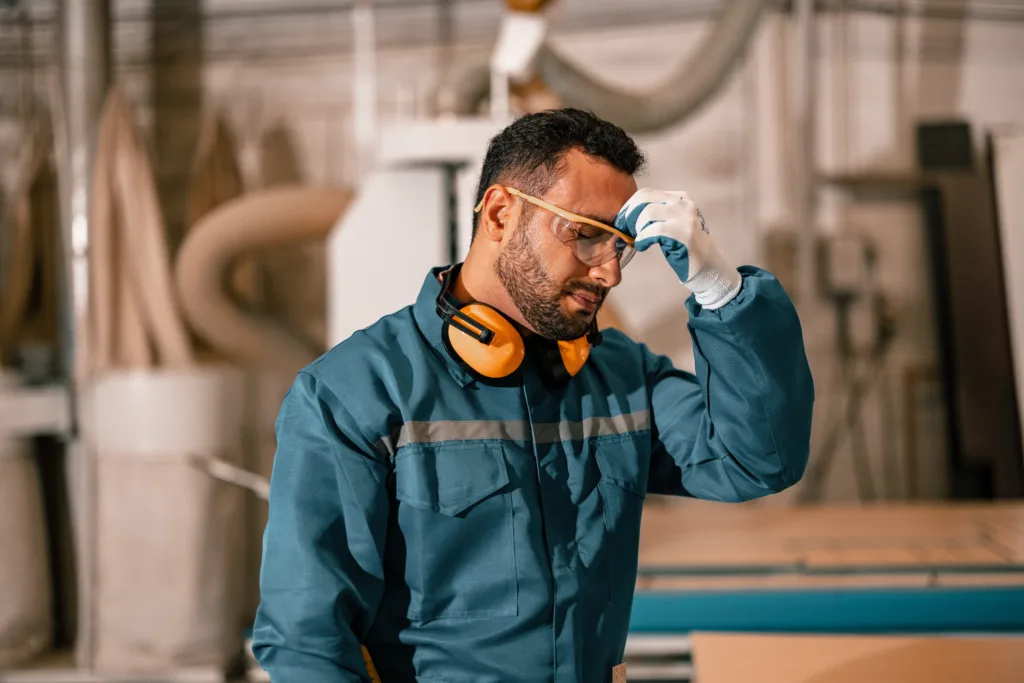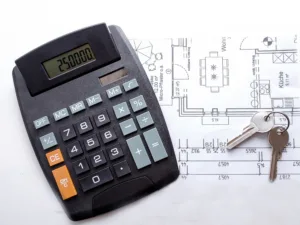In today’s fast-paced world, mental health has rightly moved to the forefront of our collective consciousness. Yet, certain sectors, like the construction industry, often slip under the radar. However, the wellbeing of the mind is as crucial in these physically demanding professions as it is in any other realm of work.
The construction industry, known for its inherent high-risk nature, is a critical arena where the importance of mental health should not be underestimated. In fact, it’s an industry where the focus on mental health training and wellbeing should be amplified.
Why, you may ask? The answer is straightforward yet profound. Mental health doesn’t just influence our personal lives; it permeates into our professional world, affecting our productivity, safety measures, and overall work satisfaction. In the construction industry, the stakes are even higher. Poor mental health can directly impact construction deadlines, cost efficiency, and most importantly, site safety.
As we delve into the depth of this topic, we aim to shed light on the current state of mental health in the construction industry, underscore its significance, outline the barriers to better mental health, and propose viable strategies for improvement. This journey will also involve exploring case studies that demonstrate successful mental health initiatives within this sector.
In this comprehensive guide, we hope to initiate a critical conversation on improving mental health within the construction industry, a dialogue that will inspire change and lead to safer, happier, and more productive workplaces.
So, join us as we explore the mental health landscape in construction, charting a path towards a future where mental wellbeing is considered as pivotal as physical safety in this crucial industry.
Table of Contents
Current State of Mental Health in the Construction Industry
When we gaze at the towering skyscrapers, the awe-inspiring bridges, or the sprawling highways stretching towards the horizon, it’s easy to overlook the human element that drives this impressive industry. The construction sector, bustling with activity and dominated by hard hats and heavy machinery, often cloaks the very human concerns of its workforce. One of those, often unnoticed, is mental health.
Recent research shows that mental health issues are more prevalent in the construction industry than we’d like to admit. A study by the Center for Construction Research and Training revealed that construction workers are at a significantly higher risk for certain mental health issues compared to other industries. Particularly alarming is the high rate of suicide among construction workers, which is about four times higher than the national average for all industries.
Various stressors unique to the construction industry contribute to this worrying state. The physically demanding nature of the work, long hours, time away from family, job insecurity, and the pressure to meet tight deadlines all combine to create a high-stress environment. It’s not just the stress itself, but the chronic nature of it, the contributing factors that can lead to a multitude of mental health issues like anxiety, depression, substance abuse, and even suicidal thoughts.
Compounding this issue is the stigma surrounding mental health in the industry. The construction industry has long been marked by a ‘tough guy’ culture, where showing emotional vulnerability is often seen as a sign of weakness. This can make it difficult for those struggling with mental health issues to seek help, worsening the problem and creating a vicious cycle.
In essence, the construction industry is grappling with a silent mental health crisis – one that affects not just the individuals involved, but the productivity, safety, and overall wellbeing of the industry. It’s a crisis that demands immediate attention, thoughtful conversation, and effective action. With this understanding, we can begin to explore how to improve mental health within this industry.
Importance of Mental Health in Construction
Having shed light on the current state of mental health in the construction industry, it’s vital to fully comprehend why mental health care is such a crucial aspect of this field.
Firstly, mental health significantly impacts productivity. As with any other industry, the construction sector thrives on the energy, creativity, and commitment of its workforce. When workers grapple with mental health issues, their ability to focus, problem-solve, and maintain efficiency can be compromised. Anxiety, depression, and stress can all lead to increased absenteeism and presenteeism (working while sick), which can dramatically affect a project’s timeline and the overall productivity of the construction firm.
Secondly, safety, a paramount concern in construction, is closely tied to the mental wellbeing of the workforce. Construction sites, laden with heavy machinery and high-risk tasks, require alertness, clear judgment, and precise coordination. Mental health issues can impair these faculties, increasing the risk of accidents and injuries. Therefore, ensuring mental wellbeing is not just a matter of personal health, but also a critical safety measure on construction sites.
Thirdly, employee satisfaction and retention are directly linked to mental health. Workers who feel their mental health is valued and cared for by their employers are more likely to report job satisfaction, show loyalty, and exhibit lower turnover rates. On the other hand, ignoring mental health can lead to high employee attrition, which adds recruitment and training costs, thereby affecting the company’s bottom line.
Moreover, beyond the tangible aspects of productivity and safety, it’s essential to recognize that construction workers, like all of us, have a fundamental right to mental wellbeing. The construction industry, by prioritizing mental health, can play a pivotal role in destigmatizing mental health issues, promoting overall wellbeing, and building more inclusive and supportive work environments.
In essence, mental health is not a sideline issue for construction professionals but a core element of the construction industry’s functioning. Addressing mental health issues is not just about preventing problems; it’s about unleashing the full potential of the workforce, enhancing safety, and ultimately, building a more resilient and productive construction industry.
Challenges to Improving Mental Health in Construction
As we continue our exploration of mental health in the construction industry, it’s essential to address the hurdles that stand in the way of improving this aspect of the industry. Recognizing these barriers is the first step toward developing effective strategies to overcome them.
One of the most significant mental health challenges, is a lack of awareness and understanding of mental health. Despite increasing global conversations around this subject, mental health remains an often misunderstood concept within the construction sector. Many individuals may not recognize the signs of mental health issues, either in themselves or their colleagues, until these problems become severe. Furthermore, understanding the complex interplay between work-related stress and mental health outcomes is not always straightforward.
Next is the challenge of stigma and discrimination. As mentioned earlier, the construction industry often fosters a ‘macho’ culture, where workers are expected to be tough, both physically and emotionally. This mindset can create an environment where mental health issues are either dismissed or hidden due to fear of judgment or ridicule. Workers may worry about appearing weak or incapable, leading to an unwillingness to discuss untreated mental health issues or seek help.
Another barrier lies in the lack of access to mental health resources. Although this problem is not exclusive to the construction workforce, it can be more acute in this industry due to factors like irregular working hours, remote work sites, and the transient nature of many construction jobs. These conditions can make it challenging for workers to access traditional mental health services, and they may not know where to turn when they need help.
Finally, the high-pressure environment of construction can contribute to mental health struggles. Tight deadlines, physical demands, and job insecurity can all create a high-stress environment that can exacerbate mental health issues. While a certain amount of pressure can be a normal part of the job, when it becomes a chronic issue, it can have severe repercussions for workers’ physical and mental health.
Recognizing these challenges, it’s clear that improving mental health in the construction industry is no small task. However, with a strategic approach and a commitment to change, it is possible to create a construction industry where mental health is valued and prioritized.
Steps to Improve Mental Health in the Construction Industry
Having laid out the importance and challenges associated with mental health in the construction industry, it’s time to explore practical steps we can take to make a positive difference. While the road might be rocky, every journey begins with a single step, and ours starts here.
First and foremost, companies need to implement clear and robust mental health policies. This approach goes beyond merely paying lip service to mental health. It involves establishing a comprehensive plan that includes recognizing mental health as a vital aspect of workplace safety, providing clear guidelines on dealing with mental health issues, and setting up support systems for employees who are struggling. By having policies in place, companies send a strong message that mental health matters and is taken seriously.
Providing access to mental health resources is another crucial step. This might mean offering counseling services, giving workers time off for mental health reasons, using employee assistance programs or providing health insurance that covers mental health treatment. In a more innovative approach, companies could also explore digital solutions like mental health apps, teletherapy services, and online support groups that can help overcome barriers like remote work locations or unusual work hours.
Next, companies should invest in training and mental health awareness programs. This step involves educating everyone in the company – from top management to the newest recruit – about the importance of mental health, how to recognize the signs of mental health issues, and what to do if they or someone else is struggling. These programs can go a long way in promoting understanding, empathy, and support within the workforce.
Furthermore, creating a supportive work environment is vital. Companies need to actively work towards fostering a culture where employees feel comfortable discussing mental health issues without fear of judgment or backlash. This change can be achieved by encouraging open conversations, promoting positive mental health practices, and demonstrating that seeking help is a sign of strength, not weakness.
Last but not least, companies must focus on reducing job stress. While stress is an inevitable part of any job, steps can be taken to manage it effectively. This approach could involve improving work schedules, encouraging regular breaks, providing job security, or simply ensuring that workers have a reasonable workload and fair deadlines.
While this is not an exhaustive list, these steps provide a starting point for improving mental health in the construction industry. Remember, change won’t happen overnight, but with a steady commitment, we can build a future where mental health is prioritized just as much as any other aspect of the construction industry.
Case Studies: Successful Mental Health Initiatives in Construction
To further illustrate the potential of mental health initiatives within the construction industry, let’s explore a couple of real-world case studies. These examples showcase the proactive steps some companies are taking to prioritize mental health and provide a benchmark for other firms to strive for.
1. Building Mental Health (BMH) – UK Construction Industry
Building Mental Health (BMH) is an initiative that has taken a comprehensive approach to tackling mental health issues within the UK’s construction industry. Recognizing the importance of mental health, BMH has designed an array of resources to help companies address this issue effectively.
One of their most impactful initiatives is their “Five-Step Framework” that provides clear, practical guidance to construction firms on how to implement a positive mental health culture. This framework involves designing and delivering mental health policies, providing access to resources and support, raising awareness about mental health, developing mental health skills and training, and continuously improving and sustaining mental health initiatives.
BMH also offers mental health first aid training and online resources, all designed specifically for the construction industry. Thanks to their efforts, numerous UK construction companies have improved their mental health support systems and culture, resulting in better mental wellbeing for countless workers.
2. The “Mates in Construction” Program – Australia
In Australia, the “Mates in Construction” program is a prime example of an industry-driven approach to mental health. This program is a joint initiative between building unions, employers, and industry groups to provide suicide prevention resources and mental health support for construction workers.
Their approach revolves around three main components: providing training to workers to help them identify colleagues who might be struggling with mental health disorders, offering access to a 24/7 helpline, and developing ‘case management’ procedures to ensure that those in need receive professional help. This approach has not only improved the mental health outcomes for many construction workers but has also significantly reduced the suicide rate within the industry.
These case studies serve as a testament to what can be achieved when the construction industry prioritizes mental health. They demonstrate that, with commitment, strategy, and perseverance, it is possible to create a supportive and caring environment within the construction sector that promotes mental wellbeing for all its workers.
The Future of Mental Health in the Construction Industry
Having traversed the current landscape of mental health in the construction industry, it’s time to cast our gaze forward and envision what the future might hold. With the pressing need for change clear, we’re on the brink of a new era that prioritizes mental health within the construction industry.
One of the driving forces in the industry’s future will be a shift in organizational culture. The macho, tough-it-out ethos that has traditionally dominated the industry is being challenged, making way for a more inclusive, empathetic, and supportive environment. Acknowledging that mental health issues do not equate to weakness, but rather a common aspect of human experience, will foster an environment where individuals feel comfortable discussing their struggles and seeking help.
We’re also likely to see an increased focus on education and training. As more companies understand the importance of mental health, we can expect greater investment in training programs that equip workers with the knowledge to recognize and respond to mental health issues. Awareness programs that demystify mental health and normalize conversations around it will be integral to this shift.
Advances in technology will play a significant role in addressing mental health concerns in the construction industry. Digital mental health platforms, mobile apps, and telehealth services can provide accessible, flexible, and personalized support for construction workers, irrespective of their location or working hours. Integrating these tools into mental health strategies can make support available at the click of a button.
Lastly, the future will see a holistic approach to worker wellbeing. Rather than focusing solely on physical safety, companies will recognize the importance of overall wellbeing – physical, mental, and emotional. This broader perspective will lead to more comprehensive health and safety policies, ensuring every worker is supported in every aspect of their health.
The road ahead is long, and change won’t happen overnight. But with commitment, perseverance, and an industry-wide effort, we can pave the way for a future where mental health is a core priority in the construction industry, benefiting workers, companies, and society at large.
Conclusion
The conversation around mental health has evolved significantly over the years, but in industries such as construction, there’s still a long way to go. As we’ve discussed, mental health in the construction industry is a topic that cannot be overlooked. With alarming rates of stress, anxiety, depression, and suicide, it’s clear that urgent action is needed.
However, it’s not all doom and gloom. As highlighted in the case studies, there are already initiatives making a substantial difference in the industry, setting the pace for others to follow. By implementing robust mental health policies, providing access to resources, fostering a supportive work culture, and investing in education and training, construction companies can take significant strides towards improving mental health.
Looking forward, the future of mental health in the construction industry is promising. As we embrace a culture of empathy, invest in technology, and take a holistic approach to worker wellbeing, we can build an industry that values and supports mental health.
In the end, it’s crucial to remember that the construction industry is not just about buildings, roads, and bridges – it’s about the people who make all these things possible. These workers deserve a work environment where they can not only thrive professionally but also maintain their mental wellbeing. And as we take steps towards this goal, we’re not just improving an industry – we’re changing lives.
About the Author

Mikk Ilumaa
Mikk Ilumaa is the CEO of Bauwise, a leader in construction financial management software with over ten years of experience in the construction software industry. At the helm of Bauwise, Mikk leverages his extensive background in developing construction management solutions to drive innovation and efficiency. His commitment to enhancing the construction process through technology makes him a pivotal figure in the industry, guiding Bauwise toward setting new standards in construction financial management. View profile






